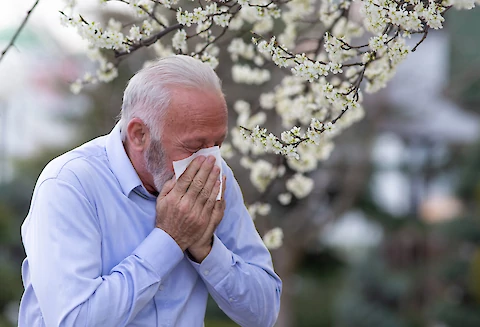
The elderly are more likely to develop allergies because their immune systems change as they age. Allergies can trigger other health problems, such as respiratory distress and heart disease, making identifying and treating allergies in seniors especially important. In this blog post, we'll discuss the common causes of allergies in seniors and the symptoms to look out for. We'll also discuss treatments and tips on managing allergens day-to-day.
What Causes Allergies in Seniors?
The three core allergens most commonly affecting seniors are:
- Dust mites
- Pollen
- Mold
As we age, our immune systems weaken. This causes a decreased ability to fight off allergies more easily. Allergies can trigger other health problems in seniors, such as respiratory distress, asthma attacks, and hay fever. They can also worsen existing conditions like heart disease or eczema. Seniors should be aware of their environmental triggers so they can minimize exposure or seek medical treatment if needed.
Symptoms of Allergies in Seniors
Seniors may experience itchy and watery eyes, runny nose, and sneezing. An allergist or healthcare provider should address symptoms such as hives, swelling, or breathing difficulties immediately.
Treatments for Allergies in Seniors
When it comes to treating seniors' allergies, several options are available:
Over-the-counter Medications
Over-the-counter (OTC) medications are often the first line of treatment for allergies in seniors. Antihistamines and decongestants are two of the most commonly used OTC medications. Antihistamines can help relieve symptoms such as itching, sneezing, and runny nose. Decongestants can help reduce congestion and sinus pressure.
Choose medications that are appropriate for seniors. Some medications may have side effects or interactions with other medications they may be taking.
Other Medical Treatments
If OTC medications are not effective or if symptoms are severe, seniors may require other medical treatments. Allergy shots, also known as immunotherapy, can help reduce the severity of symptoms over time. Prescription medications may also help seniors with allergies.
Natural Remedies
Several natural remedies can help relieve allergy symptoms in seniors. These include dietary changes, such as avoiding certain foods that may trigger allergies. Lifestyle adjustments like regular exercise or stress reduction techniques may also help manage allergies.
Seniors should always consult a healthcare provider before starting any new treatment or medication for allergies. Some medicines may have side effects or interactions with other medications they may be taking. By working with their healthcare provider, seniors can find effective treatment options that will help relieve their allergy symptoms and improve their overall quality of life.
Looking for More Tips on Managing Your Allergies?
When it comes to allergies in seniors, prevention and treatment are essential. With the proper knowledge, we can help our elderly loved ones manage their symptoms so they can enjoy a healthy life.
If you or your senior loved one needs assistance managing allergies, Senior Helpers of Blue Ridge is here to help. Our team is dedicated to providing compassionate care and support every step of the way. We can help identify triggers, locate specialists for advanced treatments, or monitor medications. Contact us today to learn how we can provide personalized care for your needs in Charlottesville, Winchester, and Warrenton!